Player Profiles
Andrew Amos (20 September 1863 – 2 October 1931)
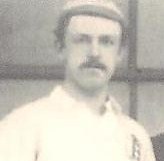
1884-1889 Appearances 47 Goals 0
Amos was born in Southwark on 20th September 1863 and attended Charterhouse School, before progressing to Clare College, Cambridge. Whilst at Cambridge he gained three blues appearing in the varsity football matches from 1883/84 to 1885/86, finishing on the winning side on each occasion.
Amos won two England caps appearing against Scotland in 1885 and Wales in 1886 and also appeared for Old Carthusians, Hitchin Town, Hertfordshire and Casuals. Amos played in the half-back position and was known for his heading ability, which was rare in the 1880's and was also noted for feeding the attack.
Amos was ordained in 1887 and ministered in south east London from 1889 until 1922 when he became Rector of Rotherhithe. He was also a councillor on the Bermondsey Borough Council, and later elected an alderman. Amos died in Guy's Hospital on 2nd October 1931.
Amos was born in Southwark on 20th September 1863 and attended Charterhouse School, before progressing to Clare College, Cambridge. Whilst at Cambridge he gained three blues appearing in the varsity football matches from 1883/84 to 1885/86, finishing on the winning side on each occasion.
Amos won two England caps appearing against Scotland in 1885 and Wales in 1886 and also appeared for Old Carthusians, Hitchin Town, Hertfordshire and Casuals. Amos played in the half-back position and was known for his heading ability, which was rare in the 1880's and was also noted for feeding the attack.
Amos was ordained in 1887 and ministered in south east London from 1889 until 1922 when he became Rector of Rotherhithe. He was also a councillor on the Bermondsey Borough Council, and later elected an alderman. Amos died in Guy's Hospital on 2nd October 1931.
Claude Thesiger Ashton (19 February 1901 – 31 October 1942)
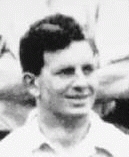
1920-1935 Appearances 208 Goals 145
C.T. Ashton was one of the greatest club men of the Corinthian F.C. and was third in the all time appearances and goals listings. Ashton was born in Calcutta, India on 19th February 1901, one of six brothers, two of which also went on to play for Corinth. Ashton showed his sporting prowess from an early age and whilst at Winchester College, he captain of the football, cricket, rackets and fives teams. Ashton progressed to Trinity College, Cambridge where he represented the University at football, hockey and cricket gaining blues in all three sports.
Ashton continued his sporting success with the Corinthian F.C. and appeared in every F.A. Cup game up to and including the 1934/35 season, scoring two goals against Walsall and once against Newcastle United in the 1926/27 campaign and a hat trick against Norwich City in 1928/29. His goal scoring total of 145 goals in 208 games is even more impressive when you consider that he played over 30 games in defence, and he played in practically every position on the field for the club. It was as centre forward that Ashton made most of his appearances, but it was commonly thought that his best position was wing-half.
Ashton was capped by England in 1925 against Ireland and was also a regular in the England amateur eleven gaining 13 caps between 1922 on 1931. Ashton also appeared for Old Wykehamists in the Arthur Dunn Cup and the amateurs in the 1924 F.A. Charity Shield; later serving as vice president of the A.F.A.
In the Summer months, Ashton continued to play cricket and played 89 matches for Essex County Cricket Club and on retiring from football assisted Beckenham Hockey Club and even played in England trials at that sport. Ashton was by profession a charted accountant and worked for Price, Waterhouse and Co., before becoming a member of the London Stock Exchange. In 1938, he joined the Balloon Barrage and in 1941 transferred to operational duties, becoming a pilot with the RAF. Ashton died on active service as a result of a mid-air collision on 31st October 1942, aged 41.
C.T. Ashton was one of the greatest club men of the Corinthian F.C. and was third in the all time appearances and goals listings. Ashton was born in Calcutta, India on 19th February 1901, one of six brothers, two of which also went on to play for Corinth. Ashton showed his sporting prowess from an early age and whilst at Winchester College, he captain of the football, cricket, rackets and fives teams. Ashton progressed to Trinity College, Cambridge where he represented the University at football, hockey and cricket gaining blues in all three sports.
Ashton continued his sporting success with the Corinthian F.C. and appeared in every F.A. Cup game up to and including the 1934/35 season, scoring two goals against Walsall and once against Newcastle United in the 1926/27 campaign and a hat trick against Norwich City in 1928/29. His goal scoring total of 145 goals in 208 games is even more impressive when you consider that he played over 30 games in defence, and he played in practically every position on the field for the club. It was as centre forward that Ashton made most of his appearances, but it was commonly thought that his best position was wing-half.
Ashton was capped by England in 1925 against Ireland and was also a regular in the England amateur eleven gaining 13 caps between 1922 on 1931. Ashton also appeared for Old Wykehamists in the Arthur Dunn Cup and the amateurs in the 1924 F.A. Charity Shield; later serving as vice president of the A.F.A.
In the Summer months, Ashton continued to play cricket and played 89 matches for Essex County Cricket Club and on retiring from football assisted Beckenham Hockey Club and even played in England trials at that sport. Ashton was by profession a charted accountant and worked for Price, Waterhouse and Co., before becoming a member of the London Stock Exchange. In 1938, he joined the Balloon Barrage and in 1941 transferred to operational duties, becoming a pilot with the RAF. Ashton died on active service as a result of a mid-air collision on 31st October 1942, aged 41.
Harold Godfrey Bache (20 April 1889 – 15 February 1916)

1909-1915 Appearances 43 Goals 95
Harold Godfrey Bache had a truly wonderful scoring record and was, on a goals per game ratio, the most prolific scorer that Corinthian F.C. had in its history. He was born on 20th August 1889 at Churchill in Worcestershire and went on to be educated King Edward VI School in Birmingham and then Caius College, Cambridge. Whilst at Cambridge he gained blues at football, cricket and lawn tennis and even won the University Lawn Tennis Championship in 1911.
Unfortunately for Bache he was at the height of his powers during "The Split" years and so he was never capped by the full England team; he did however obtain an A.F.A. international cap against Wales. Bache also played for West Bromich Albion and continued his cricket playing for Worcestershire who he made 20 appearances for.
On the outbreak of World War One, Bache enlisted in the Lancashire Regiment, where he obtained his commission to the Lancashire Fusiliers in October 1914 becoming a Lieutenant. Bache still appeared in two further charity games for the Corinthian F.C. against Aldershot Command, scoring four goals. He was later posted to France and then Belgium where he was killed on 15th February 1916 at Comines Canal Bank, Ypres aged just 26 years.
Harold Godfrey Bache had a truly wonderful scoring record and was, on a goals per game ratio, the most prolific scorer that Corinthian F.C. had in its history. He was born on 20th August 1889 at Churchill in Worcestershire and went on to be educated King Edward VI School in Birmingham and then Caius College, Cambridge. Whilst at Cambridge he gained blues at football, cricket and lawn tennis and even won the University Lawn Tennis Championship in 1911.
Unfortunately for Bache he was at the height of his powers during "The Split" years and so he was never capped by the full England team; he did however obtain an A.F.A. international cap against Wales. Bache also played for West Bromich Albion and continued his cricket playing for Worcestershire who he made 20 appearances for.
On the outbreak of World War One, Bache enlisted in the Lancashire Regiment, where he obtained his commission to the Lancashire Fusiliers in October 1914 becoming a Lieutenant. Bache still appeared in two further charity games for the Corinthian F.C. against Aldershot Command, scoring four goals. He was later posted to France and then Belgium where he was killed on 15th February 1916 at Comines Canal Bank, Ypres aged just 26 years.
Norman Coles Bailey (23 July 1857 – 13 January 1923)
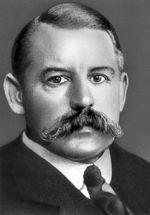
1885-1889 Appearances 16 Goals 0
Norman Coles Bailey was born in Streatham on 23rd July 1857 and attended Westminster School, who he represented at football and cricket. Bailey enjoyed a distinguished football career and was capped 19 times for England between 1878 and 1887 and this included ten consecutive caps against Scotland, seven of which were as captain. Amongst his many achievements, he helped Clapham Rovers to win the 1880 F.A. Cup final and was runner up with the same club a year earlier and also appeared for Old Westminsters, Swifts, Casuals, Wanderers, London and Surrey.
Bailey went onto serve on the F.A. Committee from 1882-1884 and was Vice President from 1887-1890.
Bailey was the first amateur to player to use his head on an equal footing with the professionals, and was one of greatest centre-halves of the early days, using his strength and pace to good effect. As a cricketer he was also quite useful and played for Streatham Cricket Club for many years.
In 1880 he was admitted as a solicitor and he practised in London with the firm, Baileys, Shaw and Gillett. He died on 13th January 1923 at Cowley in Middlesex following an illness which lasted only a few days.
Norman Coles Bailey was born in Streatham on 23rd July 1857 and attended Westminster School, who he represented at football and cricket. Bailey enjoyed a distinguished football career and was capped 19 times for England between 1878 and 1887 and this included ten consecutive caps against Scotland, seven of which were as captain. Amongst his many achievements, he helped Clapham Rovers to win the 1880 F.A. Cup final and was runner up with the same club a year earlier and also appeared for Old Westminsters, Swifts, Casuals, Wanderers, London and Surrey.
Bailey went onto serve on the F.A. Committee from 1882-1884 and was Vice President from 1887-1890.
Bailey was the first amateur to player to use his head on an equal footing with the professionals, and was one of greatest centre-halves of the early days, using his strength and pace to good effect. As a cricketer he was also quite useful and played for Streatham Cricket Club for many years.
In 1880 he was admitted as a solicitor and he practised in London with the firm, Baileys, Shaw and Gillett. He died on 13th January 1923 at Cowley in Middlesex following an illness which lasted only a few days.
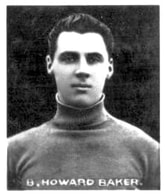
BENJAMIN HOWARD BAKER (13 FEBRUARY 1892 - 10 SEPTEMBER 1987)
1921-1933 Appearances 210 Goals 0
Liverpool born Baker was a goalkeeping stalwart for Corinthian FC throughout the 1920s and it was his dramatic save in the final moments against Blackburn in the FA Cup 1st Round in 1924 that secured Corinth's first win in the competition. Baker was also goalkeeper for Chelsea, Everton, Preston North End and Oldham Athletic football clubs and was capped for England twice. Although he initially played as a defender, he took the keeper position after his ankle was injured while on active duty in a Royal Navy mine sweeping operation during World War I.
Baker excelled in a wide range of sports, including tennis and high jump. In singles, doubles and mixed doubles, he competed in the 1929 Northern Qualifying Tournament for Wimbledon and won the 1932 Welsh Covered Courts tennis competition. Individually, he held British records in the high jump (1.95 m, from 1921 to 1946) and triple jump. He competed in these events at the 1912 and 1920 Olympic Games and finished in 6–11th places. He was also an international-level water polo goalkeeper.
Later, he retired to Warminster in Wiltshire where he died at the age of 95.
1921-1933 Appearances 210 Goals 0
Liverpool born Baker was a goalkeeping stalwart for Corinthian FC throughout the 1920s and it was his dramatic save in the final moments against Blackburn in the FA Cup 1st Round in 1924 that secured Corinth's first win in the competition. Baker was also goalkeeper for Chelsea, Everton, Preston North End and Oldham Athletic football clubs and was capped for England twice. Although he initially played as a defender, he took the keeper position after his ankle was injured while on active duty in a Royal Navy mine sweeping operation during World War I.
Baker excelled in a wide range of sports, including tennis and high jump. In singles, doubles and mixed doubles, he competed in the 1929 Northern Qualifying Tournament for Wimbledon and won the 1932 Welsh Covered Courts tennis competition. Individually, he held British records in the high jump (1.95 m, from 1921 to 1946) and triple jump. He competed in these events at the 1912 and 1920 Olympic Games and finished in 6–11th places. He was also an international-level water polo goalkeeper.
Later, he retired to Warminster in Wiltshire where he died at the age of 95.
Edward Charles Bambridge (30 July 1858 – 8 November 1935)
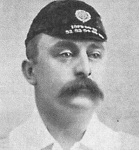
1885-1889 Appearances 27 Goals 7
Edward Charles Bambridge was a founder member of the club and was described as the greatest outside-left of his day, fast with excellent ball control. He was born in Windsor on 30th July 1858 and learned the game at St. Mark's School, before moving on to Malvern College. Bambridge went onto gain 18 caps for England, helped found the Swifts Football Club and also appeared for Casuals, Windsor Home Park, Streatham, Upton Park and Clapham Rovers.
"Bam" as he was always known, appeared in the first North v South match at the Oval in 1880 and also featured for London in their series of matches against Sheffield. He served on the F.A. Committee from 1883-1886 and was later honorary secretary of the Corinthian F.C. between 1923 and 1932, where he was assisted in the task by his son. Professionally, Bam worked in the insurance business with Lloyd's.
Corinthian FC founder NL Jackson paid the following compliment to Bam: "Bambridge never lost his temper, and always smilingly took, or gave, genuine hard charges. I have never seen a wing player with better control of the ball or going so straight, while his ability to centre hard and fast all along the ground was extraordinary. Victory or defeat never varied his good humour, and he was always the life and soul of our touring parties when he joined them." Bam died in London on 8th November 1935.
Alan Theodore Barber (17 June 1905 – 10 March 1985)

1927-1935 Appearances 80 Goals 0
Alan Theodore Barber was one Corinth's sporting all rounder's and combined his footballing exploits with playing for Yorkshire County Cricket Club. He was born in Ecclesall, Sheffield on 17th June 1905 and educated at Shrewsbury School and Queen's College, Oxford where he captained both the football and cricket elevens, and he was also a Half Blue in golf.
Barber graduated in 1929 and for one season in 1930 was captain of Yorkshire. The same year he became an assistant master at Ludgrove and he was promoted in 1937 to being headmaster, a position he held until retirement in 1973. Barber's biggest match for Corinth was the 1933 F.A. Cup tie with West Ham United, whilst he also played for Old Salopians and making the occasional appearance for Casuals. He died at Ludgrove on 10th March 1985.
Alan Theodore Barber was one Corinth's sporting all rounder's and combined his footballing exploits with playing for Yorkshire County Cricket Club. He was born in Ecclesall, Sheffield on 17th June 1905 and educated at Shrewsbury School and Queen's College, Oxford where he captained both the football and cricket elevens, and he was also a Half Blue in golf.
Barber graduated in 1929 and for one season in 1930 was captain of Yorkshire. The same year he became an assistant master at Ludgrove and he was promoted in 1937 to being headmaster, a position he held until retirement in 1973. Barber's biggest match for Corinth was the 1933 F.A. Cup tie with West Ham United, whilst he also played for Old Salopians and making the occasional appearance for Casuals. He died at Ludgrove on 10th March 1985.
Richard Raine Barker (29 May 1869 – 1 October 1940)
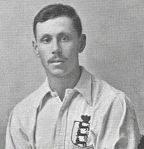
1893-1899 Appearances 43 Goals 1
Richard Raine Barker was born in Kensington on 29th May 1869 and was educated at Repton School, who he represented at football. Barker played for Corinth for a number of years and gained his only cap for England in 1895 against Wales, one of eleven Corinthians who featured in this international.
He also played for Casuals, who he helped to reach the final of the inaugural F.A. Amateur Cup final, before losing to Middlesbrough. Barker played in the wing-half position on both the left and right flanks. His strengths being his passing and kicking, but he lacked pace and it was said he was too slow to be an international. Barker was an engineer by profession and at one time he was manager of the Bromley Electric Light Company. He died on 1st October 1940.
Richard Raine Barker was born in Kensington on 29th May 1869 and was educated at Repton School, who he represented at football. Barker played for Corinth for a number of years and gained his only cap for England in 1895 against Wales, one of eleven Corinthians who featured in this international.
He also played for Casuals, who he helped to reach the final of the inaugural F.A. Amateur Cup final, before losing to Middlesbrough. Barker played in the wing-half position on both the left and right flanks. His strengths being his passing and kicking, but he lacked pace and it was said he was too slow to be an international. Barker was an engineer by profession and at one time he was manager of the Bromley Electric Light Company. He died on 1st October 1940.
Alfred George "Baishe" Bower (10 November 1895 – 30 June 1970)
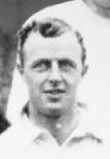
1919-1930 Appearances 180 Goals 0
Alfred George Bower was the most capped Corinthian between the wars. He was born in Bromley on 10th November 1895 and was educated at Charterhouse School , where he remarkably failed to get his football colours. After serving in World War One he played for Corinthian F.C., Casuals, Chelsea where he made nine appearances in the Football League and Old Carthusians and was the last current Corinthian to gain an England cap, achieving five between 1923 and 1927 featuring twice against Belgium and Wales and once against Ireland. He also gained 13 amateur international caps between 1921 and 1928.
Bower played at both left and right back and was one of the most prominent amateurs of the 1920's. He was an exceptionally good tackler and strong in the air. Bower was a calm head and could be inspirational to his colleagues, but his game could be affected badly if he was having problems as captain. From 1928 to 1933, Bower served on the F.A. Committee.
Bower served in the Army and worked on the Stock Exchange from 1919 to 1954, before becoming a welfare officer to a Croydon firm until 1960. He died on 30th June 1970.
Alfred George Bower was the most capped Corinthian between the wars. He was born in Bromley on 10th November 1895 and was educated at Charterhouse School , where he remarkably failed to get his football colours. After serving in World War One he played for Corinthian F.C., Casuals, Chelsea where he made nine appearances in the Football League and Old Carthusians and was the last current Corinthian to gain an England cap, achieving five between 1923 and 1927 featuring twice against Belgium and Wales and once against Ireland. He also gained 13 amateur international caps between 1921 and 1928.
Bower played at both left and right back and was one of the most prominent amateurs of the 1920's. He was an exceptionally good tackler and strong in the air. Bower was a calm head and could be inspirational to his colleagues, but his game could be affected badly if he was having problems as captain. From 1928 to 1933, Bower served on the F.A. Committee.
Bower served in the Army and worked on the Stock Exchange from 1919 to 1954, before becoming a welfare officer to a Croydon firm until 1960. He died on 30th June 1970.
George Brann (23 April 1865 – 14 June 1954)
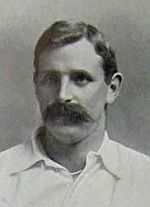
1885-1893 Appearances 32 Goals 8
George Brann, a distinguished all round athlete was born in Eastbourne on 23rd April 1865 and attended Ardingly College, at a time when the college team, consisting of masters and boys could take on any team in Sussex at both football and cricket. Brann went onto play for Swifts and Slough F.C. as well England whom he made three appearances for between 1886 and 1891.
He was a wing forward difficult to stop because of his weight and pace, which he used to transfer himself and the ball from one end of the field to the other by the most direct route regardless of anybody who should get in his way. His cricket career saw him play for Sussex for 20 years and in a very strong side only featured at third in the batting in 1901, despite having an average of 74. He also went on various cricket tours to Australia, South Africa and North America. Brann scored 11,150 runs and holds the record eighth wicket partnership for Sussex with C.L.A. Smith set in 1902.
After an attack of neuritis partially crippled his right hand, he took up golf and won along with E.G. Rand upset the odds at Walton Heath in 1910, where they won the London Amateur Foursomes Trophy. He was also secretary of Home Park Golf Club in Surbiton. Brann taught at Ardingly between 1885 and 1887 and died at Surbiton on 14th June 1954.
George Brann, a distinguished all round athlete was born in Eastbourne on 23rd April 1865 and attended Ardingly College, at a time when the college team, consisting of masters and boys could take on any team in Sussex at both football and cricket. Brann went onto play for Swifts and Slough F.C. as well England whom he made three appearances for between 1886 and 1891.
He was a wing forward difficult to stop because of his weight and pace, which he used to transfer himself and the ball from one end of the field to the other by the most direct route regardless of anybody who should get in his way. His cricket career saw him play for Sussex for 20 years and in a very strong side only featured at third in the batting in 1901, despite having an average of 74. He also went on various cricket tours to Australia, South Africa and North America. Brann scored 11,150 runs and holds the record eighth wicket partnership for Sussex with C.L.A. Smith set in 1902.
After an attack of neuritis partially crippled his right hand, he took up golf and won along with E.G. Rand upset the odds at Walton Heath in 1910, where they won the London Amateur Foursomes Trophy. He was also secretary of Home Park Golf Club in Surbiton. Brann taught at Ardingly between 1885 and 1887 and died at Surbiton on 14th June 1954.
Cuthbert James "Pinky" Burnup (21 November 1875 – 5 April 1960)

1894-1901 Appearances 79 Goals 28
Cuthert James Burnup was born in Blackheath on 21st November 1875 and was educated at Malvern College where he was captain of cricket and racquets and Cambridge University, where he achieved Blues in both football (1895-1898) and cricket.
Burnup toured with the Corinthians to South Africa in 1897. He played on the left wing and was considered a quick player who could dribble the ball effectively. Burnup also played football for Old Malvernians and Casuals who he helped to win the London Charity Cup in 1897. In 1896 he gained his only England cap against Scotland.
It was as a cricketer that Burnup really excelled and he was one of the great names in Kent cricket in the early 1900's. He was a fine opening batsman and consistently scored runs though out his career, finishing with a total of 13,585 runs from a career from 1895 to 1907. His many achievements include scoring the first ever double century for Kent, a score of exactly 200 at Old Trafford in 1900, scoring 26 centuries, not to mention being invited to tour Holland, America, New Zealand and Australia. In 1903 he was the Kent captain.
Burnup worked in London as a stockbroker and then later in commerce. He died on 5th April 1960 in Golders Green.
Cuthert James Burnup was born in Blackheath on 21st November 1875 and was educated at Malvern College where he was captain of cricket and racquets and Cambridge University, where he achieved Blues in both football (1895-1898) and cricket.
Burnup toured with the Corinthians to South Africa in 1897. He played on the left wing and was considered a quick player who could dribble the ball effectively. Burnup also played football for Old Malvernians and Casuals who he helped to win the London Charity Cup in 1897. In 1896 he gained his only England cap against Scotland.
It was as a cricketer that Burnup really excelled and he was one of the great names in Kent cricket in the early 1900's. He was a fine opening batsman and consistently scored runs though out his career, finishing with a total of 13,585 runs from a career from 1895 to 1907. His many achievements include scoring the first ever double century for Kent, a score of exactly 200 at Old Trafford in 1900, scoring 26 centuries, not to mention being invited to tour Holland, America, New Zealand and Australia. In 1903 he was the Kent captain.
Burnup worked in London as a stockbroker and then later in commerce. He died on 5th April 1960 in Golders Green.
William Nevill "Nuts" Cobbold (4 February 1862 – 8 April 1922)
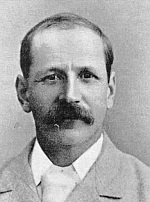
1884-1888 Appearances 46 Goals 40
William Nevill Cobbold, otherwise known as 'The Prince of Dribblers' or 'Nuts' was born in Long Melford, Suffolk on 4th February 1863. Cobbold was educated at Charterhouse and then progressed to Cambridge University and won four Blues between 1883 and 1886. Whilst at University he also represented Cambridge at tennis and was useful cricketer, later making one appearance for Kent. In all Cobbold was selected nine times to represent England scoring seven goals.
Cobbold was extremely fast and was hard to stop, but despite being a brilliant individual player, he was part of the revolution in the game which led to great team play and combined tactics.
"Built on ideal football lines, with sturdy legs and hips that could have carried a far heavier body than his, he was the finest dribbler ever seen. He played inside-left, and, swathed in rubber bandages and ankle-guards, he was careful to avoid getting hurt. He had a perculiar shuffling run, and a wonderful knack of shooting at quite unexpected moments and from quite unexpected angles. His shots were extremely accurate rather than particularly hard. His weakness was that he never headed the ball."
Cobbold went onto become a successful Army tutor and was one of the best known coaches in the country. In later years he suffered from bad health, but still remained full of life and energy and kept up a keen interest in the careers of all his former pupils who he taught at West Wratting. Cobbold died on 8th April 1922.
William Nevill Cobbold, otherwise known as 'The Prince of Dribblers' or 'Nuts' was born in Long Melford, Suffolk on 4th February 1863. Cobbold was educated at Charterhouse and then progressed to Cambridge University and won four Blues between 1883 and 1886. Whilst at University he also represented Cambridge at tennis and was useful cricketer, later making one appearance for Kent. In all Cobbold was selected nine times to represent England scoring seven goals.
Cobbold was extremely fast and was hard to stop, but despite being a brilliant individual player, he was part of the revolution in the game which led to great team play and combined tactics.
"Built on ideal football lines, with sturdy legs and hips that could have carried a far heavier body than his, he was the finest dribbler ever seen. He played inside-left, and, swathed in rubber bandages and ankle-guards, he was careful to avoid getting hurt. He had a perculiar shuffling run, and a wonderful knack of shooting at quite unexpected moments and from quite unexpected angles. His shots were extremely accurate rather than particularly hard. His weakness was that he never headed the ball."
Cobbold went onto become a successful Army tutor and was one of the best known coaches in the country. In later years he suffered from bad health, but still remained full of life and energy and kept up a keen interest in the careers of all his former pupils who he taught at West Wratting. Cobbold died on 8th April 1922.
Bertie Oswald Corbett (15 May 1875 – 30 November 1967)

1896-1909 Appearances 153 Goals 30
Bertie Oswald Corbett was born in Thame on 15th May 1875 and is still famed within the club for writing the first history of the club 'The Annals of the Corinthian F.C.' in 1906. Corbett was educated at Thame Grammar School and progressed to Oxford University where he gained Blues in football.
An outstanding winger, Corbett made his debut for Corinthian FC on Boxing Day 1896 in a 3-3 draw with Leicester and played in all of the club's first three tours to Europe as well as the 1906 tour to Canada and the USA. He remained in continuous membership of Corinthians, Casuals and later the Corinthian-Casuals until he died on 30th November 1967. He was also secretary of the Corinthian F.C. between 1902 and 1904.
Corbett also played for Reading and Slough during the 1906/07 season whilst teaching in the area, as well as being capped once by England in 1901 against Wales. At the age of 15 he represented Oxfordshire; he played through out his career in the outside-left position and was noted for his pace and body swerve. G.O. Smith thought the most satisfying goal of his whole career, which was scored in the 2-1 victory against Aston Villa in the Sheriff of London Shield, came about from a pass by Corbett.
One of his many achievements came in 1903 when he helped to settle the controversy surrounding the use of penalty kicks in public schools matches. His other sporting achievements included playing cricket for Buckinghamshire and once for Derbyshire.
Corbett was a teacher by profession and started at Brighton College, before moving to Ludgrove. Later he ran his own prep school at Shardlow Hall in Derbyshire until he retired to Waddon Manor in Dorset where he had over 700 acres of land on which to start his new career as a farmer. During the war he handed over half his land to the nation.
He died at Waddon Manor in Dorset at the age of 92.
Bertie Oswald Corbett was born in Thame on 15th May 1875 and is still famed within the club for writing the first history of the club 'The Annals of the Corinthian F.C.' in 1906. Corbett was educated at Thame Grammar School and progressed to Oxford University where he gained Blues in football.
An outstanding winger, Corbett made his debut for Corinthian FC on Boxing Day 1896 in a 3-3 draw with Leicester and played in all of the club's first three tours to Europe as well as the 1906 tour to Canada and the USA. He remained in continuous membership of Corinthians, Casuals and later the Corinthian-Casuals until he died on 30th November 1967. He was also secretary of the Corinthian F.C. between 1902 and 1904.
Corbett also played for Reading and Slough during the 1906/07 season whilst teaching in the area, as well as being capped once by England in 1901 against Wales. At the age of 15 he represented Oxfordshire; he played through out his career in the outside-left position and was noted for his pace and body swerve. G.O. Smith thought the most satisfying goal of his whole career, which was scored in the 2-1 victory against Aston Villa in the Sheriff of London Shield, came about from a pass by Corbett.
One of his many achievements came in 1903 when he helped to settle the controversy surrounding the use of penalty kicks in public schools matches. His other sporting achievements included playing cricket for Buckinghamshire and once for Derbyshire.
Corbett was a teacher by profession and started at Brighton College, before moving to Ludgrove. Later he ran his own prep school at Shardlow Hall in Derbyshire until he retired to Waddon Manor in Dorset where he had over 700 acres of land on which to start his new career as a farmer. During the war he handed over half his land to the nation.
He died at Waddon Manor in Dorset at the age of 92.
George Huth Cotterill (4 April 1868 – 11 October 1950)
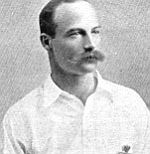
1886-1898 Appearances 65 Goals 53
George Huth Cotterill was born in Brighton on 4th April 1868 and attended Brighton College whom he played for between 1882 and 1886, the latter two years as captain. Cotterill progressed to Cambridge University gaining Blues on four occasions between 1888 and 1891. His other clubs included Old Brightonians, Burgess Hill, Weybridge and he also played representative matches for Surrey and Sussex.
Cotterill was a good sporting all rounder and as a cricketer, he played for Cambridge without getting a Blue and Sussex between 1886 and 1890, whilst also playing Rugby for Blackheath and Surrey. His other sports included athletics in both track and field and rowing.
At football, Cotterill was a prolific goal scorer and averaged almost a goal a game, playing in the centre-forward position. He had a powerful build, pace and was gifted at dribbling and shooting. Cotterill died on 1st October 1950 in Llandaff, Glamorgan.
George Huth Cotterill was born in Brighton on 4th April 1868 and attended Brighton College whom he played for between 1882 and 1886, the latter two years as captain. Cotterill progressed to Cambridge University gaining Blues on four occasions between 1888 and 1891. His other clubs included Old Brightonians, Burgess Hill, Weybridge and he also played representative matches for Surrey and Sussex.
Cotterill was a good sporting all rounder and as a cricketer, he played for Cambridge without getting a Blue and Sussex between 1886 and 1890, whilst also playing Rugby for Blackheath and Surrey. His other sports included athletics in both track and field and rowing.
At football, Cotterill was a prolific goal scorer and averaged almost a goal a game, playing in the centre-forward position. He had a powerful build, pace and was gifted at dribbling and shooting. Cotterill died on 1st October 1950 in Llandaff, Glamorgan.
Frederick Norman Smith Creek, MBE. MC. (12 January 1898 – 26 July 1980)
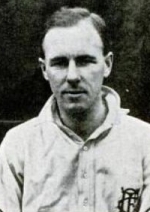
1920-1936 Appearances 146 Goals 152
Norman Creek was born in Darlington on 12th January 1898 and attended Darlington Grammar School where he captained the football team. He progressed to Cambridge University where he won Blues in 1920 and 1922, after being injured in 1921. By this time he had started playing semi regularly for Corinth, but it was after he graduated he became a fixture in their side and he exploded onto the scene with 21 goals in just 12 games during the 1922/23 season. He would go onto average more than a goal a game and to feature in the majority of the Corinthian F.C.'s F.A. Cup ties until the 1934/35 season. In 1922 he signed amateur forms with Darlington and made two Football League appearances between 1922 and 1924.
In 1923 Creek gained his only England cap, scoring in a 4-1 victory over France. He did however gain five amateur international caps between 1922 and 1932. Creek bowed out in style for the Corinthian F.C. and in his last game in 1936 against Wiltshire scored four goals. Creek had the honour of scoring the Corinthian F.C.'s first F.A. Cup goal against Brighton in the 1922/23 season.
Creek served in the Army during World War One earning himself the M.C., this was later complimented by and M.B.E., but he essentially devoted his life to football and after leaving the teaching profession, worked for the Football Association from 1954 to 1963 and managed the England amateur international side and the Olympic Games team. Following this Creek became a Daily Telegraph football writer for nearly 20 years and wrote the second history of the club 'A History of the Corinthian F.C.' published in 1932.
Creek died at his Folkestone home on 16th July 1980 and his obituary stated; 'He departed as he had lived peacefully for he was the kindly gentle soul with a ready laugh who always sought the best in people and things'.
Norman Creek was born in Darlington on 12th January 1898 and attended Darlington Grammar School where he captained the football team. He progressed to Cambridge University where he won Blues in 1920 and 1922, after being injured in 1921. By this time he had started playing semi regularly for Corinth, but it was after he graduated he became a fixture in their side and he exploded onto the scene with 21 goals in just 12 games during the 1922/23 season. He would go onto average more than a goal a game and to feature in the majority of the Corinthian F.C.'s F.A. Cup ties until the 1934/35 season. In 1922 he signed amateur forms with Darlington and made two Football League appearances between 1922 and 1924.
In 1923 Creek gained his only England cap, scoring in a 4-1 victory over France. He did however gain five amateur international caps between 1922 and 1932. Creek bowed out in style for the Corinthian F.C. and in his last game in 1936 against Wiltshire scored four goals. Creek had the honour of scoring the Corinthian F.C.'s first F.A. Cup goal against Brighton in the 1922/23 season.
Creek served in the Army during World War One earning himself the M.C., this was later complimented by and M.B.E., but he essentially devoted his life to football and after leaving the teaching profession, worked for the Football Association from 1954 to 1963 and managed the England amateur international side and the Olympic Games team. Following this Creek became a Daily Telegraph football writer for nearly 20 years and wrote the second history of the club 'A History of the Corinthian F.C.' published in 1932.
Creek died at his Folkestone home on 16th July 1980 and his obituary stated; 'He departed as he had lived peacefully for he was the kindly gentle soul with a ready laugh who always sought the best in people and things'.
Samuel Hulme Day (29 December 1878 – 21 February 1950)
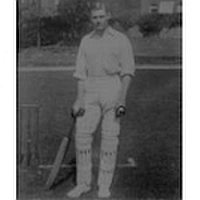
1898-1914 Appearances 108 Goals 118
Samuel Hulme Day is one of a select band of Corinthians who scored over one hundred goals, although this has almost been forgotten, probably due to 68 of them being scored on tour. Sammy Day, as he was known was born on 29th December 1878 in Peckham Rye and attended Malvern College, it was during his time there that he appeared for Kent at cricket and scored a century in his first county match. Day then moved to Cambridge and gained a cricket Blue as a freshman in 1899, later captaining the University in 1901. Day appeared just once for the football eleven, but went onto develop into a one of the best inside-forwards, playing for Corinth, in the 10-3 demolition of Bury in the Sheriff of London Shield.
Day was capped three times by England at full international level in 1906 and once at amateur level. Due to 'The Split', Day made a further five appearances in A.F.A. internationals. Day's other club was Old Malvernians. During the 1906 tour to Canada and the United States, Day scored a hat trick of hat tricks against All New York and scored another impressive total of seven against Cincinnati.
Day was headmaster of Heatherdown preparatory school for many years, and prior to this was assistant master at Westminster School. Day died at his home in Chobham, Surrey on 21st February 1950.
Samuel Hulme Day is one of a select band of Corinthians who scored over one hundred goals, although this has almost been forgotten, probably due to 68 of them being scored on tour. Sammy Day, as he was known was born on 29th December 1878 in Peckham Rye and attended Malvern College, it was during his time there that he appeared for Kent at cricket and scored a century in his first county match. Day then moved to Cambridge and gained a cricket Blue as a freshman in 1899, later captaining the University in 1901. Day appeared just once for the football eleven, but went onto develop into a one of the best inside-forwards, playing for Corinth, in the 10-3 demolition of Bury in the Sheriff of London Shield.
Day was capped three times by England at full international level in 1906 and once at amateur level. Due to 'The Split', Day made a further five appearances in A.F.A. internationals. Day's other club was Old Malvernians. During the 1906 tour to Canada and the United States, Day scored a hat trick of hat tricks against All New York and scored another impressive total of seven against Cincinnati.
Day was headmaster of Heatherdown preparatory school for many years, and prior to this was assistant master at Westminster School. Day died at his home in Chobham, Surrey on 21st February 1950.
Alexander Graham Doggart, JP (2 June 1897 - 7 June 1963)
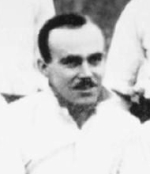
1919-1933 Appearances 203 Goals 207
One of the club's true greats, Alexander Graham Doggart was the leading all time Corinthian goal scorer netting 207 goals in 203 appearances over the course of 14 years. He was born in Bishop Auckland on 2nd June 1897 and attended Darlington Grammar School, later attending Bishop Stortford School whom he played for between 1912 and 1916 and later became a governor of. His education was broken by World War One, but on being demobilized in January 1919 he went to King's College, Cambridge. Whilst at Cambridge, Doggart gained degrees for Engineering and Economics and won Blues for football in 1920 and 1921, having stood down in favour of his friend F.N.S. Creek in 1919 because of injury. He then went on to study as a chartered accountant, qualifying in 1927.
Doggart was a regular for Corinthians between 1920 and 1932, but still found time to play for Darlington where he made two Football League appearances, as well as Bishop Auckland in 1923 and Casuals from 1924 onwards. He scored a hat trick on his Corinth debut against Charterhouse in 1919 and proceeded to score regulary, his most famous goal coming in the 1-0 victory over Blackburn Rovers in the 1923/24 F.A. Cup. Doggart gained his only full international cap for England in 1923 in a 2-2 draw with Belgium, whilst gaining four amateur international caps between 1921 and 1929.
From 1932, Doggart was an F.A. Councillor and in 1951 he became vice president and an England selector from 1954. In 1961 he became chairman, having already been president of the Corinthian-Casuals and Selsey football clubs for may years. He was also heavily involved in cricket having gained cricket Blues whilst at Cambridge and also playing for Durham and Middlesex and served on the Sussex County Cricket Club committee from 1949, as well as the M.C.C. finance committee from 1955, the year he became a full member. Doggart also served in the Royal Observer Corps (Selsey) and was honorary secretary for seven years of the Selsey branch of the R.N.L.I., whilst being a justice of the peace for West Sussex.
Due to his independence Doggart made fresh changes at the F.A. which included the appointment of Alf Ramsey as England manager. Doggart died suddenly, collapsing at the Football Association's A.G.M. on 7th June 1963. His obituary stated; "In spite of shy, quiet ways and soft speech he was a determined leader of the whole (F.A.) Council, a body who by circumstance usually have many conflicting interests. There was no such conflict within Doggart. A member of no League organisation, he was an F.A. man pure and simple, through and through."
One of the club's true greats, Alexander Graham Doggart was the leading all time Corinthian goal scorer netting 207 goals in 203 appearances over the course of 14 years. He was born in Bishop Auckland on 2nd June 1897 and attended Darlington Grammar School, later attending Bishop Stortford School whom he played for between 1912 and 1916 and later became a governor of. His education was broken by World War One, but on being demobilized in January 1919 he went to King's College, Cambridge. Whilst at Cambridge, Doggart gained degrees for Engineering and Economics and won Blues for football in 1920 and 1921, having stood down in favour of his friend F.N.S. Creek in 1919 because of injury. He then went on to study as a chartered accountant, qualifying in 1927.
Doggart was a regular for Corinthians between 1920 and 1932, but still found time to play for Darlington where he made two Football League appearances, as well as Bishop Auckland in 1923 and Casuals from 1924 onwards. He scored a hat trick on his Corinth debut against Charterhouse in 1919 and proceeded to score regulary, his most famous goal coming in the 1-0 victory over Blackburn Rovers in the 1923/24 F.A. Cup. Doggart gained his only full international cap for England in 1923 in a 2-2 draw with Belgium, whilst gaining four amateur international caps between 1921 and 1929.
From 1932, Doggart was an F.A. Councillor and in 1951 he became vice president and an England selector from 1954. In 1961 he became chairman, having already been president of the Corinthian-Casuals and Selsey football clubs for may years. He was also heavily involved in cricket having gained cricket Blues whilst at Cambridge and also playing for Durham and Middlesex and served on the Sussex County Cricket Club committee from 1949, as well as the M.C.C. finance committee from 1955, the year he became a full member. Doggart also served in the Royal Observer Corps (Selsey) and was honorary secretary for seven years of the Selsey branch of the R.N.L.I., whilst being a justice of the peace for West Sussex.
Due to his independence Doggart made fresh changes at the F.A. which included the appointment of Alf Ramsey as England manager. Doggart died suddenly, collapsing at the Football Association's A.G.M. on 7th June 1963. His obituary stated; "In spite of shy, quiet ways and soft speech he was a determined leader of the whole (F.A.) Council, a body who by circumstance usually have many conflicting interests. There was no such conflict within Doggart. A member of no League organisation, he was an F.A. man pure and simple, through and through."
John William Henry Tyler Douglas (3 September 1882 – 19 December 1930)
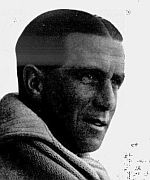
1910-1923 Appearances 15 Goals 2
Johnny Douglas was certainly one of the more colourful Corinthian F.A. members, although he did not play that regularly. Douglas was born in Clapton on 3rd September 1882 and attended Felstead School, before joining his fathers timber merchants firm John H. Douglas and Co. In 1901, Douglas entered first class cricket with Essex and after a baptism of fire, he survived to slowly become a fine player. In 1911 Douglas became captain of Essex and this elevated his play to the next level and he was selected to tour Australia with the M.C.C. that same year. He later visited South Africa and Australia again in 1920/21. Between 1901 and 1928, Douglas scored 24,531 runs for Essex including 26 hundreds, whilst taking 1,893 wickets. As a result of this he was selected for 23 Tests and he led England to an Ashes triumph in 1911-12.
His first real achievement came in the sport of boxing where by 1905 he had become the best middleweight in England winning the amateur championship and this was followed in 1908, when Douglas became Olympic champion, in what all good judges said 'was one of the most brilliant exhibitions of skilful boxing allied to tremendous hitting ever seen.' Douglas played a number of games for Corinth, and also the Casuals where he gained an A.F.A. international cap during "The Split" years.
Douglas died in true heroic circumstances trying to rescue his fathers life after the boat in which they were travelling, "The Oberon", collided in fog on 19th December 1930, seven miles south of Laeso. The boat took just three minutes to sink and only four passengers survived.
Johnny Douglas was certainly one of the more colourful Corinthian F.A. members, although he did not play that regularly. Douglas was born in Clapton on 3rd September 1882 and attended Felstead School, before joining his fathers timber merchants firm John H. Douglas and Co. In 1901, Douglas entered first class cricket with Essex and after a baptism of fire, he survived to slowly become a fine player. In 1911 Douglas became captain of Essex and this elevated his play to the next level and he was selected to tour Australia with the M.C.C. that same year. He later visited South Africa and Australia again in 1920/21. Between 1901 and 1928, Douglas scored 24,531 runs for Essex including 26 hundreds, whilst taking 1,893 wickets. As a result of this he was selected for 23 Tests and he led England to an Ashes triumph in 1911-12.
His first real achievement came in the sport of boxing where by 1905 he had become the best middleweight in England winning the amateur championship and this was followed in 1908, when Douglas became Olympic champion, in what all good judges said 'was one of the most brilliant exhibitions of skilful boxing allied to tremendous hitting ever seen.' Douglas played a number of games for Corinth, and also the Casuals where he gained an A.F.A. international cap during "The Split" years.
Douglas died in true heroic circumstances trying to rescue his fathers life after the boat in which they were travelling, "The Oberon", collided in fog on 19th December 1930, seven miles south of Laeso. The boat took just three minutes to sink and only four passengers survived.
Arthur Tempest Blakiston Dunn (12 August 1860 – 20 February 1902)
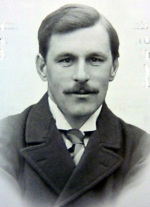
1884-1900 Appearances 31 Goals 12
Arthur Tempest Blakiston Dunn is still one of the most famous names in amateur football, as following his premature death at the age of 41, his friends started a competition in his memory which is still going strong today. Dunn was born in Whitby on 12th August 1860 and went to Eton College, before progressing to Cambridge University where he gained blues in 1883 and 1884. During this period he featured for the Old Etonians, winning an F.A. Cup winners medal in 1882 as well as a runner up in 1883. Dunn also won four England caps between 1883 and 1892 and represented both Cambridgeshire and Norfolk. Not surprisingly he had limited time to play for Corinth but still amassed a reasonable total of appearances.
Dunn was a teacher by profession and in 1892 founded Ludgrove School at New Barnet, which later employed fellow Corinthians G.O. Smith and W.J. Oakley as joint headmasters. He died in his sleep in Ludgrove on 20 February 1902 at the young age of 41, just days after refereeing an Oxford University match. His daughter, Mary Dunn who was born in 1900, went onto become a noted satirical writer best known for the 'Lady Addle' books.
Today, his name lives on in the form of the Arthur Dunn Cup, which was donated by fellow Corinthian R.C. Gosling and is still awarded annually by members of the Dunn family.
Arthur Tempest Blakiston Dunn is still one of the most famous names in amateur football, as following his premature death at the age of 41, his friends started a competition in his memory which is still going strong today. Dunn was born in Whitby on 12th August 1860 and went to Eton College, before progressing to Cambridge University where he gained blues in 1883 and 1884. During this period he featured for the Old Etonians, winning an F.A. Cup winners medal in 1882 as well as a runner up in 1883. Dunn also won four England caps between 1883 and 1892 and represented both Cambridgeshire and Norfolk. Not surprisingly he had limited time to play for Corinth but still amassed a reasonable total of appearances.
Dunn was a teacher by profession and in 1892 founded Ludgrove School at New Barnet, which later employed fellow Corinthians G.O. Smith and W.J. Oakley as joint headmasters. He died in his sleep in Ludgrove on 20 February 1902 at the young age of 41, just days after refereeing an Oxford University match. His daughter, Mary Dunn who was born in 1900, went onto become a noted satirical writer best known for the 'Lady Addle' books.
Today, his name lives on in the form of the Arthur Dunn Cup, which was donated by fellow Corinthian R.C. Gosling and is still awarded annually by members of the Dunn family.
Frederick Harold Ewer (30 September 1898 – 29 January 1971)

1922-1934 Appearances 160 Goals 3
F.H. Ewer was a great club man and made 160 appearances which was the tenth most in the history of the club. He was born in West Ham on 30th September 1898 and joined the Corinthians and the Casuals in 1922. He played 105 games for the Casuals and it was whilst them that he was awarded his two England full international caps in 1924 against Belgium and France. He also gained 14 amateur international caps between 1924 and 1930. Ewer also featured for the amateurs in the 1924 F.A. Charity Shield.
Ewer played in the wing-half position and could play on either side of the field; he was amongst the leading amateurs of the era and was a resolute, gritty performer, who came back from many injuries and never knew when he was beaten. He later became joint secretary of the Corinthian F.C. in the 1937/38 season. Ewer was a member of the Stock Exchange. He died on 29th January 1971.
F.H. Ewer was a great club man and made 160 appearances which was the tenth most in the history of the club. He was born in West Ham on 30th September 1898 and joined the Corinthians and the Casuals in 1922. He played 105 games for the Casuals and it was whilst them that he was awarded his two England full international caps in 1924 against Belgium and France. He also gained 14 amateur international caps between 1924 and 1930. Ewer also featured for the amateurs in the 1924 F.A. Charity Shield.
Ewer played in the wing-half position and could play on either side of the field; he was amongst the leading amateurs of the era and was a resolute, gritty performer, who came back from many injuries and never knew when he was beaten. He later became joint secretary of the Corinthian F.C. in the 1937/38 season. Ewer was a member of the Stock Exchange. He died on 29th January 1971.
Aubrey Howard Fabian (20 March, 1909 - 26 September, 1984)
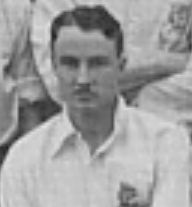
1930-1939 Appearances 77 Goals 29
Howard Fabian was another tremendous club servant and featured for Corinthians, Casuals and Corinthian-Casuals during his career. Fabian was born on 20th March 1909 in East Finchley; he was educated at Highgate School and went onto Cambridge where he gained a Blue for football.
Fabian joined the Casuals in 1928 and went onto appear 118 times for them, scoring 41 goals. Two years later he made his debut for Corinthian FC and continued to feature for both clubs throughout the next decade. He was part of the 'Corinthians and Casuals' Touring side of 1937 and played in the first ever Corinthian-Casuals match (versus Oxford City) following the amalgamation of the two clubs, before emerging after World War Two to make a further eight appearances for the team. Fabian's greatest honour was achieved whilst with the Casuals when he helped them win the 1936 F.A. Amateur Cup final against Ilford.
Fabian also played for Old Cholmeleians and made a number of appearances in the Football League for Derby County. One of the leading amateurs of the 1930's he gained six amateur caps for England. Fabian worked as a master at Repton School and died on 26th September 1984 at Cranbrook, Kent.
Howard Fabian was another tremendous club servant and featured for Corinthians, Casuals and Corinthian-Casuals during his career. Fabian was born on 20th March 1909 in East Finchley; he was educated at Highgate School and went onto Cambridge where he gained a Blue for football.
Fabian joined the Casuals in 1928 and went onto appear 118 times for them, scoring 41 goals. Two years later he made his debut for Corinthian FC and continued to feature for both clubs throughout the next decade. He was part of the 'Corinthians and Casuals' Touring side of 1937 and played in the first ever Corinthian-Casuals match (versus Oxford City) following the amalgamation of the two clubs, before emerging after World War Two to make a further eight appearances for the team. Fabian's greatest honour was achieved whilst with the Casuals when he helped them win the 1936 F.A. Amateur Cup final against Ilford.
Fabian also played for Old Cholmeleians and made a number of appearances in the Football League for Derby County. One of the leading amateurs of the 1930's he gained six amateur caps for England. Fabian worked as a master at Repton School and died on 26th September 1984 at Cranbrook, Kent.
Charles Burgess Fry, (25 April 1872 – 7 September 1956)
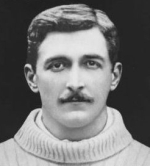
1891-1903 Appearances 74 Goals 4
Charles Burgess Fry was known as one of the finest all-round athletes of his generation. He was born in Croydon on 25th April 1872 and spent his childhood growing up in Kent. In 1885 Fry went to Repton School, before progressing to Wadham College, Oxford. At both institutions he gained distinction in both work and play gaining a first at Oxford in Classical Moderations. Whilst at Repton he was captain of both the cricket and football elevens as well as twice winning the aggregate prize for athletic sports.
His sporting career at Oxford was even more impressive and he was a triple Blue, captaining both the cricket and football elevens, whilst being president of the athletic club in his third year. In 1892 during the inter-university sports, he set a record for the long jump of 23ft. 5in. which stood for 21 years. Two years later he scored 100, not out, against Cambridge and, at football, gained an international cap for England against Ireland in 1901. Fry would have secured a fourth Blue, for Rugby, had he not suffered an injury several days prior to the university match, but still appeared for Blackheath, the Barbarians and Surrey.
A tough and skilful defender, Fry spent 12 seasons with Corinthian FC, playing at left-back, right-back and centre-half. He also made 59 appearances for Casuals, for whom he debuted at the age of 16. In 1902 he played for Southampton in the F.A. Cup final when they lost in a replay to Sheffield United.
Fry developed into a cricket great after he left Oxford, playing for Surrey before moving on to Sussex where in the summer of 1898 he blossomed into an international class player. In one year he totalled over 3,000 runs, whilst in five others scored over 2,000 and was twice first in the English batting averages and four times second. Although Fry initially struggled at international level, he finally established himself in 1905 scoring 144 at the Oval against Australia. Fry retired from first class cricket in 1921, having made 94 centuries and holding the record for consecutive centuries, having scored six consecutively during the 1901 season.
Fry's life outside the sporting world saw him make several unsuccessful attempts to enter the House of Commons standing as a Liberal, whilst also writing several books and editing a magazine entitled Fry's Magazine. He was famously quoted as saying: "I take a great interest in heaps of things that I know nothing about ... politics for one". Fry was also Captain-Superintendent of the TS Mercury, a training ship for the Royal Navy from 1908 to 1950.
In the late 1920's, Fry suffered a mental breakdown and for the rest of his life would often dress in strange and unconventional clothes. When he was in his 50's he even considered trying to become a Hollywood star! It is claimed that he had once been invited to take the vacant throne of Albania and apparently Adolf Hitler even sought his advice when setting up the Hitler Youth movement! Fry was also part of the Indian delegation at the League of Nations and enjoyed a brief broadcasting career with the BBC.
Late in his life, Fry was asked during a television interview, what, in his opinion, was his greatest achievement. After considering his answer he replied "Having a poem published in The Times: so few men, apart from Poets Laureate, have achived that." Fry passed away on 7th September 1956.
Charles Burgess Fry was known as one of the finest all-round athletes of his generation. He was born in Croydon on 25th April 1872 and spent his childhood growing up in Kent. In 1885 Fry went to Repton School, before progressing to Wadham College, Oxford. At both institutions he gained distinction in both work and play gaining a first at Oxford in Classical Moderations. Whilst at Repton he was captain of both the cricket and football elevens as well as twice winning the aggregate prize for athletic sports.
His sporting career at Oxford was even more impressive and he was a triple Blue, captaining both the cricket and football elevens, whilst being president of the athletic club in his third year. In 1892 during the inter-university sports, he set a record for the long jump of 23ft. 5in. which stood for 21 years. Two years later he scored 100, not out, against Cambridge and, at football, gained an international cap for England against Ireland in 1901. Fry would have secured a fourth Blue, for Rugby, had he not suffered an injury several days prior to the university match, but still appeared for Blackheath, the Barbarians and Surrey.
A tough and skilful defender, Fry spent 12 seasons with Corinthian FC, playing at left-back, right-back and centre-half. He also made 59 appearances for Casuals, for whom he debuted at the age of 16. In 1902 he played for Southampton in the F.A. Cup final when they lost in a replay to Sheffield United.
Fry developed into a cricket great after he left Oxford, playing for Surrey before moving on to Sussex where in the summer of 1898 he blossomed into an international class player. In one year he totalled over 3,000 runs, whilst in five others scored over 2,000 and was twice first in the English batting averages and four times second. Although Fry initially struggled at international level, he finally established himself in 1905 scoring 144 at the Oval against Australia. Fry retired from first class cricket in 1921, having made 94 centuries and holding the record for consecutive centuries, having scored six consecutively during the 1901 season.
Fry's life outside the sporting world saw him make several unsuccessful attempts to enter the House of Commons standing as a Liberal, whilst also writing several books and editing a magazine entitled Fry's Magazine. He was famously quoted as saying: "I take a great interest in heaps of things that I know nothing about ... politics for one". Fry was also Captain-Superintendent of the TS Mercury, a training ship for the Royal Navy from 1908 to 1950.
In the late 1920's, Fry suffered a mental breakdown and for the rest of his life would often dress in strange and unconventional clothes. When he was in his 50's he even considered trying to become a Hollywood star! It is claimed that he had once been invited to take the vacant throne of Albania and apparently Adolf Hitler even sought his advice when setting up the Hitler Youth movement! Fry was also part of the Indian delegation at the League of Nations and enjoyed a brief broadcasting career with the BBC.
Late in his life, Fry was asked during a television interview, what, in his opinion, was his greatest achievement. After considering his answer he replied "Having a poem published in The Times: so few men, apart from Poets Laureate, have achived that." Fry passed away on 7th September 1956.
Robert Cunliffe Gosling (15 June 1868 – 8 April 1922)
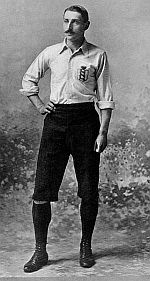
1889-1899 Appearances 49 Goals 14
Robert Cunliffe Gosling, was born in Farnham, Essex on 15th June 1868 and was educated Eton, where he like his five younger brothers excelled at football and cricket. Gosling progressed to Cambridge, where he went to Trinity and gained a Blues at football in 1890 and at cricket. Gosling also appeared for Old Etonians at football and for Essex, Eton Ramblers and I Zingari at cricket, the latter of which was his initiative. Gosling gained five England caps, one as captain, never finishing on the losing side and scoring two goals in the progress.
Gosling played as an inside-forward and was fast with a good shot and unselfish. Sir Frederick Wall, the secretary of the F.A. once described him as 'the richest man who ever played football for England.'; he was a country gentleman, succeeding his father and owned a large amount of land in Essex and Hertfordshire. He was one of the more popular squires to be found. After retiring from sport Gosling served as a Jusitice of the Peace in Essex and later became High Sheriff. He died in his bed on 18th April 1922 leaving a fortune worth £700,000 or around £21,000,000 at today's prices.
Robert Cunliffe Gosling, was born in Farnham, Essex on 15th June 1868 and was educated Eton, where he like his five younger brothers excelled at football and cricket. Gosling progressed to Cambridge, where he went to Trinity and gained a Blues at football in 1890 and at cricket. Gosling also appeared for Old Etonians at football and for Essex, Eton Ramblers and I Zingari at cricket, the latter of which was his initiative. Gosling gained five England caps, one as captain, never finishing on the losing side and scoring two goals in the progress.
Gosling played as an inside-forward and was fast with a good shot and unselfish. Sir Frederick Wall, the secretary of the F.A. once described him as 'the richest man who ever played football for England.'; he was a country gentleman, succeeding his father and owned a large amount of land in Essex and Hertfordshire. He was one of the more popular squires to be found. After retiring from sport Gosling served as a Jusitice of the Peace in Essex and later became High Sheriff. He died in his bed on 18th April 1922 leaving a fortune worth £700,000 or around £21,000,000 at today's prices.
Stanley Shute Harris (19 July 1881 – 4 May 1926)
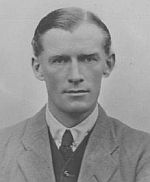
1903-1920 Appearances 60 Goals 57
Stanley Shute Harris was born in Clifton, Bristol on 19th July 1881 and attended Westminster School where he honed his football ability. Harris later progressed to Cambridge University where he gained Blues for three consecutive years 1902 to 1904, whilst being captain in last year. His playing career saw him also appear for Old Westminsters, Casuals, Worthing, Portsmouth and Surrey. Harris playing at inside-left was described as a splendidly built amateur adroit at dribbling and shooting and this helped him to achieve six full international caps for England scoring two goals and also captaining the side; he was also capped once by the England amateur team.
Harris was a useful cricketer who played for Cambridge University, although he failed to gain a Blue, but still went onto make several county championship appearances for Surrey, Gloucestershire and Sussex. Harris was headmaster of St. Ronan's School in West Worthing and was highly regarded by the pupils for his influence and guidance which shaped their lives and character, so much so that there was a committee established to raise funds for a memorial to him. Harris died on 4th May 1926.
Stanley Shute Harris was born in Clifton, Bristol on 19th July 1881 and attended Westminster School where he honed his football ability. Harris later progressed to Cambridge University where he gained Blues for three consecutive years 1902 to 1904, whilst being captain in last year. His playing career saw him also appear for Old Westminsters, Casuals, Worthing, Portsmouth and Surrey. Harris playing at inside-left was described as a splendidly built amateur adroit at dribbling and shooting and this helped him to achieve six full international caps for England scoring two goals and also captaining the side; he was also capped once by the England amateur team.
Harris was a useful cricketer who played for Cambridge University, although he failed to gain a Blue, but still went onto make several county championship appearances for Surrey, Gloucestershire and Sussex. Harris was headmaster of St. Ronan's School in West Worthing and was highly regarded by the pupils for his influence and guidance which shaped their lives and character, so much so that there was a committee established to raise funds for a memorial to him. Harris died on 4th May 1926.
Frank Hartley (20 July 1896 – 1965)
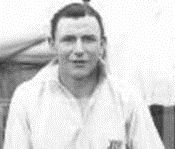
1920-1928 Appearances 87 Goals 59
Frank Hartley was a Corinthian rarity in that he did not come to the club via the tradition Oxford or Cambridge University supply chain. Hartley was born on 20th July 1896 at Shipton-under-Wychwood and came to prominence whilst playing Oxford City in the Isthmian League. He made his Corinthian debut on New Year's Eve 1920 at Anfield and although only making occasional appearances for the next couple of years, became a regular from 1924 onwards. Hartley had already signed amateur forms with Tottenham Hotspur by this stage and later in 1928 he did in fact turn professional with them at the age of 32, making seven appearances for them over the next three years.
Hartley was capped at full international level by England in 1923 against France. He also was capped seven times at amateur level between 1923 and 1926. His other sporting career saw him represent the Minor Counties at cricket and had a trial for England at Hockey. Hartley was a member of an Oxfordshire farming family. He died on 20th October 1965.
Frank Hartley was a Corinthian rarity in that he did not come to the club via the tradition Oxford or Cambridge University supply chain. Hartley was born on 20th July 1896 at Shipton-under-Wychwood and came to prominence whilst playing Oxford City in the Isthmian League. He made his Corinthian debut on New Year's Eve 1920 at Anfield and although only making occasional appearances for the next couple of years, became a regular from 1924 onwards. Hartley had already signed amateur forms with Tottenham Hotspur by this stage and later in 1928 he did in fact turn professional with them at the age of 32, making seven appearances for them over the next three years.
Hartley was capped at full international level by England in 1923 against France. He also was capped seven times at amateur level between 1923 and 1926. His other sporting career saw him represent the Minor Counties at cricket and had a trial for England at Hockey. Hartley was a member of an Oxfordshire farming family. He died on 20th October 1965.
Kenneth Edward "Jackie" Hegan, OBE (24 January 1901 – 3 March 1989)

1919-1933 Appearances 167 Goals 50
Kenneth Edward Hegan's 167 appearances was the eighth highest of any Corinthian. Playing during the clubs F.A. Cup glory years, he was an outstanding outside right and outside left. He was born in Coventry on 24th January 1901 attended Bablake School, before moving on to the Royal Military College at Sandhurst. Hegan later served with the Dublin Fusiliers and the R.A.S.C. and also represented the Army at football.
In 1924, despite his slight build and dimultive height of five foot seven and a half inches, he was said to have been the fastest player around and certainly was one of the main suppliers of goals for the likes of Doggart, Creek and C.T. Ashton. He was capped four times in 1923 by the full England team scoring four goals, two each against Belgium and France. Hegan was also capped 23 times by the England amateur team.
One of the greatest Corinthian players of all time, he once played for nearly ninety minutes with a broken tibia against Millwall in the F.A. Cup. He was always full of humour and regularly imitated the 'Old Corinthian' complete with pipe, bowler hat, long stockings and tankard of beer.
Hegan retired from the Army in 1949 as a Lieutenant-Colonel having been awarded an O.B.E. as a result of his service during World War Two. He died in 1989.
Kenneth Edward Hegan's 167 appearances was the eighth highest of any Corinthian. Playing during the clubs F.A. Cup glory years, he was an outstanding outside right and outside left. He was born in Coventry on 24th January 1901 attended Bablake School, before moving on to the Royal Military College at Sandhurst. Hegan later served with the Dublin Fusiliers and the R.A.S.C. and also represented the Army at football.
In 1924, despite his slight build and dimultive height of five foot seven and a half inches, he was said to have been the fastest player around and certainly was one of the main suppliers of goals for the likes of Doggart, Creek and C.T. Ashton. He was capped four times in 1923 by the full England team scoring four goals, two each against Belgium and France. Hegan was also capped 23 times by the England amateur team.
One of the greatest Corinthian players of all time, he once played for nearly ninety minutes with a broken tibia against Millwall in the F.A. Cup. He was always full of humour and regularly imitated the 'Old Corinthian' complete with pipe, bowler hat, long stockings and tankard of beer.
Hegan retired from the Army in 1949 as a Lieutenant-Colonel having been awarded an O.B.E. as a result of his service during World War Two. He died in 1989.
Arthur George Henfrey (19 December 1867 – 17 October 1929)
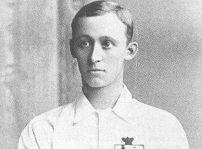
1890-1903 Appearances 68 Goals 35
Arthur George Henfrey was born in Wellingborough in 1868 and attended Wellingborough Grammar School and Cambridge University. Henfrey gained Blues in 1890 and 1891, and in the former appearance he was part of an International forward line which included future Corinthian team mates R.C. Gosling, G.H. Cotterill, J.G. Veitch and M.H. Stanbrough. Cambridge duly defeated Oxford 3-1.
An outstanding forward, Henfrey began the 1891-92 season by scoring 13 goals in 4 matches for Corinthians. Between 1891 and 1896 he was capped five times by England, scoring two goals.
Henfrey also played cricket with distinction and played for Northamptonshire from 1886 to 1899, being captain in 1893 and 1894, although he did not gain a Blue for cricket whilst at university. He also served on the Northamptonshire County Council and several other local bodies. He died on 17th October 1929 aged 61.
Arthur George Henfrey was born in Wellingborough in 1868 and attended Wellingborough Grammar School and Cambridge University. Henfrey gained Blues in 1890 and 1891, and in the former appearance he was part of an International forward line which included future Corinthian team mates R.C. Gosling, G.H. Cotterill, J.G. Veitch and M.H. Stanbrough. Cambridge duly defeated Oxford 3-1.
An outstanding forward, Henfrey began the 1891-92 season by scoring 13 goals in 4 matches for Corinthians. Between 1891 and 1896 he was capped five times by England, scoring two goals.
Henfrey also played cricket with distinction and played for Northamptonshire from 1886 to 1899, being captain in 1893 and 1894, although he did not gain a Blue for cricket whilst at university. He also served on the Northamptonshire County Council and several other local bodies. He died on 17th October 1929 aged 61.
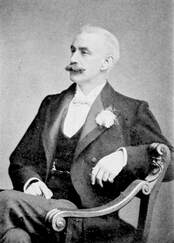
NICHOLAS LANE JACKSON (1 NOVEMBER 1849 – 26 OCTOBER 1937)
1882 Founder of Corinthian Football Club
N.L. 'Pa' Jackson was born in Hackney, London in 1849 and became a keen sportsman early in his youth. In 1877, he founded Finchley FC (now Wingate & Finchley) where he was also captain of the first team. By the age of 30, he was officiating matches as an umpire and was elected to the committee of the Football Association in 1880, serving as assistant secretary from 1881 to 1883.
It was during his tenure at the FA that Jackson founded Corinthian Football Club. He recognized that one of the main factors in Scotland’s supremacy in the early international fixtures against England was that the majority of Scots players played for Queen's Park and thus had greater opportunities to play together, whereas England’s players typically only met on the same ground when called up for an international friendly. Inviting the top players from England’s schools and universities, Jackson’s idea was to provide opportunities for the country’s best amateur players to play together by organizing midweek matches against amateur and professional clubs so as to not conflict with the players existing club obligations. Corinthian FC would thus serve as a player pool for the England squad with the players regularly playing together against quality competition.
Although initially a strong opponent of professionalism in football (his allegations that Preston North End had offered financial inducements to attract Scottish players led the FA committee to disqualify the Preston club from the FA Cup in 1884), Jackson ultimately supported the legalisation of professionalism in 1885.
In addition to founding Corinthian FC, Jackson also founded the London Football Association in 1882 and was instrumental in founding the Lawn Tennis Association in 1888. Jackson was also a prolific author. He founded the tennis journal Pastime (1883) and the cricket periodical Cricket Field (1892). His Association Football (1899) is an important source for the early history of the sport. He also edited reference works for football and rugby. His autobiography Sporting Days and Sporting Ways was published in 1932.
Nicholas Lane Jackson died in 1937 at the age of 87.
1882 Founder of Corinthian Football Club
N.L. 'Pa' Jackson was born in Hackney, London in 1849 and became a keen sportsman early in his youth. In 1877, he founded Finchley FC (now Wingate & Finchley) where he was also captain of the first team. By the age of 30, he was officiating matches as an umpire and was elected to the committee of the Football Association in 1880, serving as assistant secretary from 1881 to 1883.
It was during his tenure at the FA that Jackson founded Corinthian Football Club. He recognized that one of the main factors in Scotland’s supremacy in the early international fixtures against England was that the majority of Scots players played for Queen's Park and thus had greater opportunities to play together, whereas England’s players typically only met on the same ground when called up for an international friendly. Inviting the top players from England’s schools and universities, Jackson’s idea was to provide opportunities for the country’s best amateur players to play together by organizing midweek matches against amateur and professional clubs so as to not conflict with the players existing club obligations. Corinthian FC would thus serve as a player pool for the England squad with the players regularly playing together against quality competition.
Although initially a strong opponent of professionalism in football (his allegations that Preston North End had offered financial inducements to attract Scottish players led the FA committee to disqualify the Preston club from the FA Cup in 1884), Jackson ultimately supported the legalisation of professionalism in 1885.
In addition to founding Corinthian FC, Jackson also founded the London Football Association in 1882 and was instrumental in founding the Lawn Tennis Association in 1888. Jackson was also a prolific author. He founded the tennis journal Pastime (1883) and the cricket periodical Cricket Field (1892). His Association Football (1899) is an important source for the early history of the sport. He also edited reference works for football and rugby. His autobiography Sporting Days and Sporting Ways was published in 1932.
Nicholas Lane Jackson died in 1937 at the age of 87.

BERNARD JOY, OBE (29 OCTOBER 1911 - 18 JULY 1984)
1933-1936 Appearances 29
Bernard Joy was born in Fulham and educated at Cardinal Vaughan Memorial School. He studied at the University of London where he played for the university football team at centre half. After graduating, he played for Casuals, for whom he would go on to make 84 appearances, eventually becoming club captain and leading the team to victory in the 1936 FA Amateur Cup Final.
1936 would turn out to be quite a year for Bernard who, as well as winning the Amateur Cup, would also captain the Great Britain football team at the 1936 Olympics in Berlin, and earn a full England Cap, becoming the last Amateur player to do so. His outstanding performances quickly brought him to the attention of the Corinthians and he joined the team on a number of European tours during the 1930's, including France, Germany and Denmark.
A teacher by trade, Joy also joined Arsenal as an amateur in 1935 and would go on to make 86 first team appearances for them, earning a League Champions medal in 1937/38.
During the War, Joy enlisted in the RAF but resumed his amateur football career in 1945, playing with the newly merged Corinthian-Casuals until retiring in 1948. He then embarked on a career as a journalist, becoming a football writer for the Evening Standard and the Sunday Express. He also wrote one of the first histories of Arsenal Football Club, Forward, Arsenal!, published in 1952. His son, Chris Joy would later follow in his father's footsteps, making 415 first-team appearances for Corinthian-Casuals between 1958 and 1973.
Bernard Joy died in July 1984, aged 72.
1933-1936 Appearances 29
Bernard Joy was born in Fulham and educated at Cardinal Vaughan Memorial School. He studied at the University of London where he played for the university football team at centre half. After graduating, he played for Casuals, for whom he would go on to make 84 appearances, eventually becoming club captain and leading the team to victory in the 1936 FA Amateur Cup Final.
1936 would turn out to be quite a year for Bernard who, as well as winning the Amateur Cup, would also captain the Great Britain football team at the 1936 Olympics in Berlin, and earn a full England Cap, becoming the last Amateur player to do so. His outstanding performances quickly brought him to the attention of the Corinthians and he joined the team on a number of European tours during the 1930's, including France, Germany and Denmark.
A teacher by trade, Joy also joined Arsenal as an amateur in 1935 and would go on to make 86 first team appearances for them, earning a League Champions medal in 1937/38.
During the War, Joy enlisted in the RAF but resumed his amateur football career in 1945, playing with the newly merged Corinthian-Casuals until retiring in 1948. He then embarked on a career as a journalist, becoming a football writer for the Evening Standard and the Sunday Express. He also wrote one of the first histories of Arsenal Football Club, Forward, Arsenal!, published in 1952. His son, Chris Joy would later follow in his father's footsteps, making 415 first-team appearances for Corinthian-Casuals between 1958 and 1973.
Bernard Joy died in July 1984, aged 72.
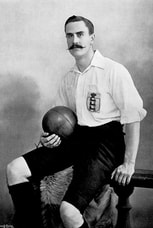
WILLIAM ROBERT MOON (7 JUNE 1868 – 9 JANUARY 1943)
1886-1901 Appearances 95 Goals 0
Maida Vale, London born goalkeeper William Robert “Billy” Moon was only 19 when he made his international debut for England in a 5-1 win against Wales at The Alexandra Recreation Ground, Crewe, in February 1888, becoming England’s youngest goalkeeper, a record that would stand until Jack Butland made his England debut 124 years later and 64 days younger.
Moon played for Corinthian FC between 1886 and 1901 and kept a clean sheet against Preston North End’s ‘Invincibles’ when Corinthians beat them during their otherwise unbeaten streak during the 1888-89 season. He won a total of 7 International caps and he was made captain of England on his final appearance against Scotland at Ewood Park in April 1891.
He also played first class cricket for Middlesex, keeping wicket in 2 matches in 1891, making 17 not out in his only first class innings (his second match was washed out before he could take his turn at bat). His younger brother Leonard also played cricket for Middlesex, test match cricket for England, as well as playing football for The Corinthians.
1886-1901 Appearances 95 Goals 0
Maida Vale, London born goalkeeper William Robert “Billy” Moon was only 19 when he made his international debut for England in a 5-1 win against Wales at The Alexandra Recreation Ground, Crewe, in February 1888, becoming England’s youngest goalkeeper, a record that would stand until Jack Butland made his England debut 124 years later and 64 days younger.
Moon played for Corinthian FC between 1886 and 1901 and kept a clean sheet against Preston North End’s ‘Invincibles’ when Corinthians beat them during their otherwise unbeaten streak during the 1888-89 season. He won a total of 7 International caps and he was made captain of England on his final appearance against Scotland at Ewood Park in April 1891.
He also played first class cricket for Middlesex, keeping wicket in 2 matches in 1891, making 17 not out in his only first class innings (his second match was washed out before he could take his turn at bat). His younger brother Leonard also played cricket for Middlesex, test match cricket for England, as well as playing football for The Corinthians.
Morgan Maddox Morgan-Owen, DSO (20 February 1877 – 14 August 1950)
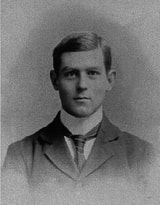
1899-1913 Appearances 170 Goals 24
Described by Norman Creek in his Corinthian volume as "probably the best centre half the club has ever had", Morgan-Owen captained Corinthians in their famous 11-3 defeat of Manchester Utd in 1904. He led the side on the club's two visits to Brazil in 1910 and 1913 and on a number of other foreign tours. He was also on the boat to South America when war was declared in 1914.
A product of Shrewsbury School and Oxford he taught at Repton where he was also a Captain in the OTC. In the years before the 14-18 war he played a remarkable 170 times for Corinthians, scoring 24 goals; also 79 games for Casuals scoring 12 goals. He won 12 full international caps for Wales.
As a player and committee man for both Corinthians and Casuals, and President of Casuals from 1922, this distinguished war hero was very much involved in bringing the two clubs together in the years leading up to 1939. When the details of the merger were finally agreed, the minutes of the first AGM for Corinthian-Casuals FC on 22 May 1939, record: "Lieutenant Colonel M.M. Morgan-Owen will be President." He held that position until he died in 1950 at the age of 77.
Described by Norman Creek in his Corinthian volume as "probably the best centre half the club has ever had", Morgan-Owen captained Corinthians in their famous 11-3 defeat of Manchester Utd in 1904. He led the side on the club's two visits to Brazil in 1910 and 1913 and on a number of other foreign tours. He was also on the boat to South America when war was declared in 1914.
A product of Shrewsbury School and Oxford he taught at Repton where he was also a Captain in the OTC. In the years before the 14-18 war he played a remarkable 170 times for Corinthians, scoring 24 goals; also 79 games for Casuals scoring 12 goals. He won 12 full international caps for Wales.
As a player and committee man for both Corinthians and Casuals, and President of Casuals from 1922, this distinguished war hero was very much involved in bringing the two clubs together in the years leading up to 1939. When the details of the merger were finally agreed, the minutes of the first AGM for Corinthian-Casuals FC on 22 May 1939, record: "Lieutenant Colonel M.M. Morgan-Owen will be President." He held that position until he died in 1950 at the age of 77.
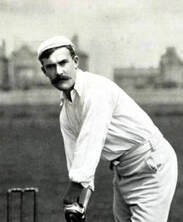
THOMAS NORWOOD PERKINS (19 DECEMBER 1870 – 26 JULY 1946)
1892-1897 Appearances 32 Goals 32
Thomas Perkins was born at Strood in Kent and was educated at St John's School, Leatherhead and Jesus College, Cambridge where he won a Blue for association football in all three years he was at University. He captained the Cambridge side in 1894-95 that beat Oxford in the varsity match.
Perkins made his sensational debut for Corinthian FC in March 1892, scoring a hat-trick in a 7-1 defeat of the Norfolk FA XI while still at Cambridge. He repeated the feat in his second game, against Scarborough, and went on to average a goal a game for the club over the next 5 years.
A notable cricketer, Perkins played for Kent, and in the game against Nottinghamshire at Trent Bridge he scored 109, which was his only first-class century. He scored 88 in the match against Lancashire in 1900 and helped put on a 221 fifth wicket partnership with Corinthian team mate Pinky Burnup, who made 200.
From 1895, Perkins became a schoolmaster at St Michael's School in Westgate-on-Sea, Kent in 1895, and at Felsted School in Essex from 1897 to 1900, where he coached the future England captain J.W.H.T. Douglas.
He died at Tonbridge in Kent in 1946 aged 75. He was described in his Wisden obituary as a "powerful soccer player" who played with "dash at centre-forward".
1892-1897 Appearances 32 Goals 32
Thomas Perkins was born at Strood in Kent and was educated at St John's School, Leatherhead and Jesus College, Cambridge where he won a Blue for association football in all three years he was at University. He captained the Cambridge side in 1894-95 that beat Oxford in the varsity match.
Perkins made his sensational debut for Corinthian FC in March 1892, scoring a hat-trick in a 7-1 defeat of the Norfolk FA XI while still at Cambridge. He repeated the feat in his second game, against Scarborough, and went on to average a goal a game for the club over the next 5 years.
A notable cricketer, Perkins played for Kent, and in the game against Nottinghamshire at Trent Bridge he scored 109, which was his only first-class century. He scored 88 in the match against Lancashire in 1900 and helped put on a 221 fifth wicket partnership with Corinthian team mate Pinky Burnup, who made 200.
From 1895, Perkins became a schoolmaster at St Michael's School in Westgate-on-Sea, Kent in 1895, and at Felsted School in Essex from 1897 to 1900, where he coached the future England captain J.W.H.T. Douglas.
He died at Tonbridge in Kent in 1946 aged 75. He was described in his Wisden obituary as a "powerful soccer player" who played with "dash at centre-forward".
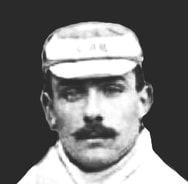
THOMAS SOWERBY ROWLANDSON, MC (22 FEBRUARY 1880 – 15 SEPTEMBER 1916)
1903-1910 Appearances 150 Goals 1
A Corinthian goalkeeping legend, Rowlandson was born in Newton Morrell in North Yorkshire and attended Charterhouse School and Trinity College Cambridge where he was a University blue. He made his debut for Corinthian FC on the club's second tour to South Africa in 1903.
It was during that tour that Rowlandson famously stood aside when the opposing team were awarded a penalty, not wishing to prevent their opponents from scoring as a result of foul play. As a mainstay between the sticks for the club over the next seven years, he participated in numerous overseas tours and even managed to score a goal in the 12-0 victory over Philadelphia in 1906!
After the breakout of the First World War in August 1914, Rowlandson enlisted in the British Army in Northallerton and was commissioned as a lieutenant in the Yorkshire Regiment on 5 September 1914. By 1 January 1916, he had been promoted to captain and won the Military Cross. Tom Rowlandson was killed at the battle of the Somme on 15 September 1916. He is buried at Bécourt Military Cemetery in France.
1903-1910 Appearances 150 Goals 1
A Corinthian goalkeeping legend, Rowlandson was born in Newton Morrell in North Yorkshire and attended Charterhouse School and Trinity College Cambridge where he was a University blue. He made his debut for Corinthian FC on the club's second tour to South Africa in 1903.
It was during that tour that Rowlandson famously stood aside when the opposing team were awarded a penalty, not wishing to prevent their opponents from scoring as a result of foul play. As a mainstay between the sticks for the club over the next seven years, he participated in numerous overseas tours and even managed to score a goal in the 12-0 victory over Philadelphia in 1906!
After the breakout of the First World War in August 1914, Rowlandson enlisted in the British Army in Northallerton and was commissioned as a lieutenant in the Yorkshire Regiment on 5 September 1914. By 1 January 1916, he had been promoted to captain and won the Military Cross. Tom Rowlandson was killed at the battle of the Somme on 15 September 1916. He is buried at Bécourt Military Cemetery in France.
Edgar Donald Reid Shearer (6 June 1909 – 9 July 1999)
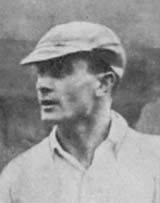
1931-1938 Appearances 50 Goals 38
E.D.R. Shearer was born in London in on 6th June 1909. The young Shearer attended Aldenham School, where he played outside right before relocating to Ireland where he lived and worked throughout his sporting life. Back in Ireland, Shearer concentrated on cricket playing for the City of Derry, where he won the North West Cup, and the Bond Cup (1927-28) for the highest batting average.
In 1929, Shearer joined The Casuals FC making his debut in October against Kingstonian. The following season saw him score 25 goals in 25 appearances for The Casuals and this attracted the attention of the Corinthian FC and he duly made his debut in April 1931, scoring against Queen's Park at Lea Bridge, before playing again for Corinth, against Arsenal in the Sheriff of London Shield, scoring again.
1931/32 started explosively for Shearer as he opened the season by scoring six goals in three games for The Casuals, before returning to Ireland and featured for Derry City scoring back to back hat tricks against Bangor and Glenavon. Shearer returned to England to play on the Corinthian FC's Christmas tour, before lining up in the F.A. Cup third round tie against Sheffield United. He was instrumental in organising Corinthian's 1932 Easter tour to Ireland in which he played for the tourists against his Derry City teammates.
During the 1933/34 and 1935/36 seasons, Shearer appeared in the important Casuals games in the F.A. Amateur Cup and in the latter season succeeded in helping Casuals lift the trophy for the only time in their history, scoring one goal in the final against Ilford.
Shearer gained many representative honours being capped seven times for the England amateur team, and also appeared on many occasions for the Irish League XI, the most notable occasions being a 3-0 win over the Scottish League in 1933 and a 2-1 victory over the Football League in 1935. He also represented Great Britain at the 1936 Olympics in Germany and appeared in the second round defeat to Poland where he scored one goal. During WWII he rose to Lieutenant Colonel in the Royal Artillery and commanded the garrison at Tobruk.
Shearer has been described as an unassuming and gentlemanly and popular figure in Irish football, which is confirmed in the fact that he arranged with Derry City that should he be selected ahead of a professional, then the professional would still be paid and receive a bonus if the team won. The meticulous records which he kept went a long way to helping Rob Cavallini's book, "Play Up Corinth", throw new light on the club.
Donald Shearer died in Sudbury in 1999 at the age of 90.
E.D.R. Shearer was born in London in on 6th June 1909. The young Shearer attended Aldenham School, where he played outside right before relocating to Ireland where he lived and worked throughout his sporting life. Back in Ireland, Shearer concentrated on cricket playing for the City of Derry, where he won the North West Cup, and the Bond Cup (1927-28) for the highest batting average.
In 1929, Shearer joined The Casuals FC making his debut in October against Kingstonian. The following season saw him score 25 goals in 25 appearances for The Casuals and this attracted the attention of the Corinthian FC and he duly made his debut in April 1931, scoring against Queen's Park at Lea Bridge, before playing again for Corinth, against Arsenal in the Sheriff of London Shield, scoring again.
1931/32 started explosively for Shearer as he opened the season by scoring six goals in three games for The Casuals, before returning to Ireland and featured for Derry City scoring back to back hat tricks against Bangor and Glenavon. Shearer returned to England to play on the Corinthian FC's Christmas tour, before lining up in the F.A. Cup third round tie against Sheffield United. He was instrumental in organising Corinthian's 1932 Easter tour to Ireland in which he played for the tourists against his Derry City teammates.
During the 1933/34 and 1935/36 seasons, Shearer appeared in the important Casuals games in the F.A. Amateur Cup and in the latter season succeeded in helping Casuals lift the trophy for the only time in their history, scoring one goal in the final against Ilford.
Shearer gained many representative honours being capped seven times for the England amateur team, and also appeared on many occasions for the Irish League XI, the most notable occasions being a 3-0 win over the Scottish League in 1933 and a 2-1 victory over the Football League in 1935. He also represented Great Britain at the 1936 Olympics in Germany and appeared in the second round defeat to Poland where he scored one goal. During WWII he rose to Lieutenant Colonel in the Royal Artillery and commanded the garrison at Tobruk.
Shearer has been described as an unassuming and gentlemanly and popular figure in Irish football, which is confirmed in the fact that he arranged with Derry City that should he be selected ahead of a professional, then the professional would still be paid and receive a bonus if the team won. The meticulous records which he kept went a long way to helping Rob Cavallini's book, "Play Up Corinth", throw new light on the club.
Donald Shearer died in Sudbury in 1999 at the age of 90.
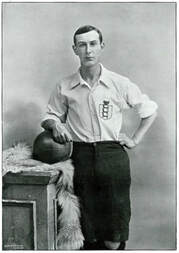
GILBERT OSWALD SMITH (25 NOVEMBER 1872 – 6 DECEMBER 1943)
1892-1903 Appearances 137 Goals 132
G.O. Smith was often referred to as "the first great centre forward". An England International and Captain, Smith's scoring record for the Corinthians – 132 goals in 137 matches – remains one of the best strike rates in the history of the game, equating to one goal for every 93 minutes played. His goal scoring record for the Casuals was even more impressive, with 42 goals in 29 appearances!
Born in Croydon but the son of a Scottish merchant who settled in India, Smith began playing football while at Charterhouse School and went on to play for Oxford University, representing the team from his first year, winning three out of four Varsity matches played against Cambridge and captaining Oxford in his final year. In addition, he played first-class cricket for Surrey.
G.O. Smith was renowned throughout his playing career for his exceptional balance and timing, and was further noted for his close control of the ball. Unlike the majority of centre-forwards of the day, Smith also excelled at passing. "He was," his obituary in The Times contended, "a maker rather than a scorer of goals" and football writer Jonathan Wilson described him as "what we would now term a false nine".
He made a total of 20 appearances for England (scoring 11 goals), between 1893 and 1901. His most productive game in an England shirt came in February 1899, when he netted three times in only five minutes and four times in all during a 13–2 demolition of Ireland.
From 1898 to 1902 Smith would also serve as the Secretary of Corinthian FC. By the time of his retirement, he was perhaps the most admired figure in the English game. He died in Lymington on 1943 at the age of 71.
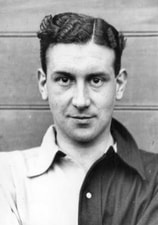
WILLIAM THOMAS WHEWELL (18 JULY 1905 - 2 OCTOBER 1940)
1925-1939 Appearances 259 Goals 30
Corinthian Football Club's all-time record holder for first team appearances, Tommy Whewell was born in Blackburn, Lancashire and attended Magdalene College, Cambridge where he captained the University football team.
An accomplished and versatile player, Whewell made the majority of his appearances either in the centre-half or right-back position. He also captained the England Amateur team as well as playing county cricket for Cambridgeshire. In addition to his 259 appearances for Corinthian FC, he also played 74 times for The Casuals (including the 1936 FA Amateur Cup Final) and once for the newly merged Corinthian-Casuals, in their first ever match.
Tommy died with his wife Eileen when their house in Hampstead suffered a direct hit during a bombing raid in October 1940, aged 36.
1925-1939 Appearances 259 Goals 30
Corinthian Football Club's all-time record holder for first team appearances, Tommy Whewell was born in Blackburn, Lancashire and attended Magdalene College, Cambridge where he captained the University football team.
An accomplished and versatile player, Whewell made the majority of his appearances either in the centre-half or right-back position. He also captained the England Amateur team as well as playing county cricket for Cambridgeshire. In addition to his 259 appearances for Corinthian FC, he also played 74 times for The Casuals (including the 1936 FA Amateur Cup Final) and once for the newly merged Corinthian-Casuals, in their first ever match.
Tommy died with his wife Eileen when their house in Hampstead suffered a direct hit during a bombing raid in October 1940, aged 36.
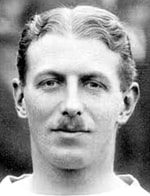
MAXWELL WOOSNAM (6 SEPTEMBER 1892 – 14 JULY 1965)
1912-1915 Appearances 17 Goals 9
Often referred to as the 'Greatest British Sportsman' in recognition of his achievements, Max Woosnam was born in Liverpool and attended Winchester College, where he represented the school at football and captained the golf and cricket teams. Later, at Cambridge, he represented the university at football, cricket, tennis and golf.
Woosnam made his debut for Corinthian FC in 1912, scoring in each of his first three appearances at centre-half, and toured with the club to Brazil in 1913 where he scored again in his first two games. In 1914, he again set sail with the Corinthians for Brazil, however the tour was cancelled when still at sea due the the outbreak of World War One and a potentially brilliant career as a footballer was brought to an end. During the war, Woosnam fought in the Gallipoli campaign and on the Western Front alongside Siegfried Sassoon with the Royal Welch Fusiliers at the Battle of the Somme.
After the war, tennis became his main focus and he won an Olympic gold at the 1920 Summer Olympics and the men’s doubles at Wimbledon the following year. Among his other achievements were captaining Manchester City and England as an amateur, scoring a century at Lord’s, compiling a 147 break at snooker and even beating Charlie Chaplin at table tennis using a butter knife for a bat!
In the 1920’s he began working for ICI where he was later appointed to the board. Max Woosnam died in 1965 of respiratory failure, having been a heavy smoker all his life.
1912-1915 Appearances 17 Goals 9
Often referred to as the 'Greatest British Sportsman' in recognition of his achievements, Max Woosnam was born in Liverpool and attended Winchester College, where he represented the school at football and captained the golf and cricket teams. Later, at Cambridge, he represented the university at football, cricket, tennis and golf.
Woosnam made his debut for Corinthian FC in 1912, scoring in each of his first three appearances at centre-half, and toured with the club to Brazil in 1913 where he scored again in his first two games. In 1914, he again set sail with the Corinthians for Brazil, however the tour was cancelled when still at sea due the the outbreak of World War One and a potentially brilliant career as a footballer was brought to an end. During the war, Woosnam fought in the Gallipoli campaign and on the Western Front alongside Siegfried Sassoon with the Royal Welch Fusiliers at the Battle of the Somme.
After the war, tennis became his main focus and he won an Olympic gold at the 1920 Summer Olympics and the men’s doubles at Wimbledon the following year. Among his other achievements were captaining Manchester City and England as an amateur, scoring a century at Lord’s, compiling a 147 break at snooker and even beating Charlie Chaplin at table tennis using a butter knife for a bat!
In the 1920’s he began working for ICI where he was later appointed to the board. Max Woosnam died in 1965 of respiratory failure, having been a heavy smoker all his life.

CHARLES WREFORD-BROWN (9 OCTOBER 1866 - 26 NOVEMBER 1951)
1888-1906 Appearances 161 Goals 8
A legendary name in the annals of Corinthian Football Club, Charles Wreford-Brown was born in Bristol and went to Charterhouse School before studying at Oriel College, Oxford, where he represented the University at both football and cricket. It was during his time at Oxford that he is credited with having coined the term "Soccer" as an abbreviation for Association Football.
Affectionately nicknamed "Mr. Corinthian", he was a leading figure for the club throughout its golden era, playing 161 games, primarily at centre-half, scoring 8 goals. In 1894, when Corinthian FC became the first and only club to ever fully represent the England National side, Charles Wreford-Brown captained the team. He would again, when the extraordinary feat was repeated a year later. He made his final appearance as a Corinthian representing the 'A' team against his old school, Charterhouse, in 1927 at the age of 61!
An accomplished cricketer, Wreford-Brown played first-class cricket for Gloucestershire as a bowler between 1886 and 1898, once taking 5 wickets in a single innings for the club.
A long time resident of Surbiton, Wreford-Brown later became Chairman of the International Selection Committee for England and served as a vice-president of the FA under Sir Stanley Rous from 1941 until his death in 1951.
1888-1906 Appearances 161 Goals 8
A legendary name in the annals of Corinthian Football Club, Charles Wreford-Brown was born in Bristol and went to Charterhouse School before studying at Oriel College, Oxford, where he represented the University at both football and cricket. It was during his time at Oxford that he is credited with having coined the term "Soccer" as an abbreviation for Association Football.
Affectionately nicknamed "Mr. Corinthian", he was a leading figure for the club throughout its golden era, playing 161 games, primarily at centre-half, scoring 8 goals. In 1894, when Corinthian FC became the first and only club to ever fully represent the England National side, Charles Wreford-Brown captained the team. He would again, when the extraordinary feat was repeated a year later. He made his final appearance as a Corinthian representing the 'A' team against his old school, Charterhouse, in 1927 at the age of 61!
An accomplished cricketer, Wreford-Brown played first-class cricket for Gloucestershire as a bowler between 1886 and 1898, once taking 5 wickets in a single innings for the club.
A long time resident of Surbiton, Wreford-Brown later became Chairman of the International Selection Committee for England and served as a vice-president of the FA under Sir Stanley Rous from 1941 until his death in 1951.